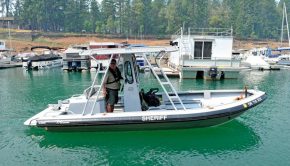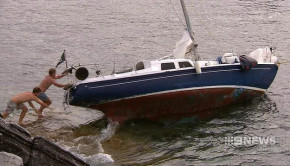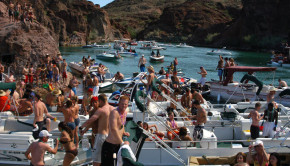BEWARE: Operation Dry Water
Published on June 3rd, 2013
(June 3, 2013) – With boating under the influence continuing to be a major factor in accidents and deaths on U.S. waterways, thousands of officers with local, state and federal agencies will again team up for Operation Dry Water (ODW) in a coordinated effort to be on the water providing heightened enforcement and awareness about the dangers of boating under the influence of drugs or alcohol.
Operation Dry Water 2013 is June 28-30, just before the Fourth of July, a holiday known for drinking and boating, and deadly accidents. Operation Dry Water is a nationwide education and enforcement initiative launched by the National Association of State Boating Law Administrators (NASBLA) in partnership with the U.S. Coast Guard.
Since the launch of Operation Dry Water in 2009, the percentage of boating fatalities with alcohol listed as a contributing factor has decreased from 19% to 17%* in the United States. Despite the decrease, BUI still accounts for a disproportional number of on-the-water deaths. In 2011, alcohol was a contributing factor in just 8 percent of boating accidents overall, but figured in 17 percent of boating fatalities**.
In 2012, 51 states and U.S. territories participated in Operation Dry Water. More than 4,500 officers from 505 local, state, and federal agencies participated in 72 hours of heightened BUI enforcement. Officers were able to remove 337 BUI operators from the water while issuing an additional 14,514 boating safety citations and warnings. In addition, law enforcement officers made contact with over 113,000 boaters concerning BUI or boating safety enforcement and awareness. From 2009 to 2012 over 1,200 BUI operators have been removed from the water and over 313,500 boaters have been contacted by a law enforcement officer during the Operation Dry Water weekends.
In 2013 NASBLA’s Operation Dry Water received the national Horizon Award, from the National Safe Boating Council, for the campaign’s dedication to moving the cause of recreational boating safety to a new level. The campaign was also recognized for its encouragement to boaters to take a pledge to make wise decisions about alcohol use, and to NEVER drink while boating.
Toby Velasquez, NASBLA president, says, “Operation Dry Water has proven to be a successful campaign. I encourage every local, state and federal agency tasked with boating law enforcement to participate in this worthwhile BUI enforcement and awareness effort.”
Officers from all 56 U.S. states, trusts and territories are expected to participate in Operation Dry Water 2013 by educating the public and providing heightened BUI enforcement for the safety of those operating a vessel as well as other boaters on the water.
For more information on this annual event, visit www.operationdrywater.org.
###
The National Association of State Boating Law Administrators is a national nonprofit organization that works to develop public policy for recreational boating safety. NASBLA represents the recreational boating authorities of all 50 states and the U.S. territories. The organization offers a variety of resources, including training, model acts, education standards and publications. Through a national network of thousands of professional educators, law enforcement officers and volunteers, NASBLA affects the lives of over 83 million American boaters.
The United States Coast Guard is a military, multi-mission, maritime service within the Department of Homeland Security and one of the nation’s five armed services. Its core roles are to protect the public, the environment, and U.S. economic and security interests in any maritime region in which those interests may be at risk, including international waters and America’s coasts, ports, and inland waterways.
*U.S. Coast Guard Recreational Boating Statistics 2012
**U.S. Coast Guard Recreational Boating Statistics 2012








 We’ll keep your information safe.
We’ll keep your information safe.